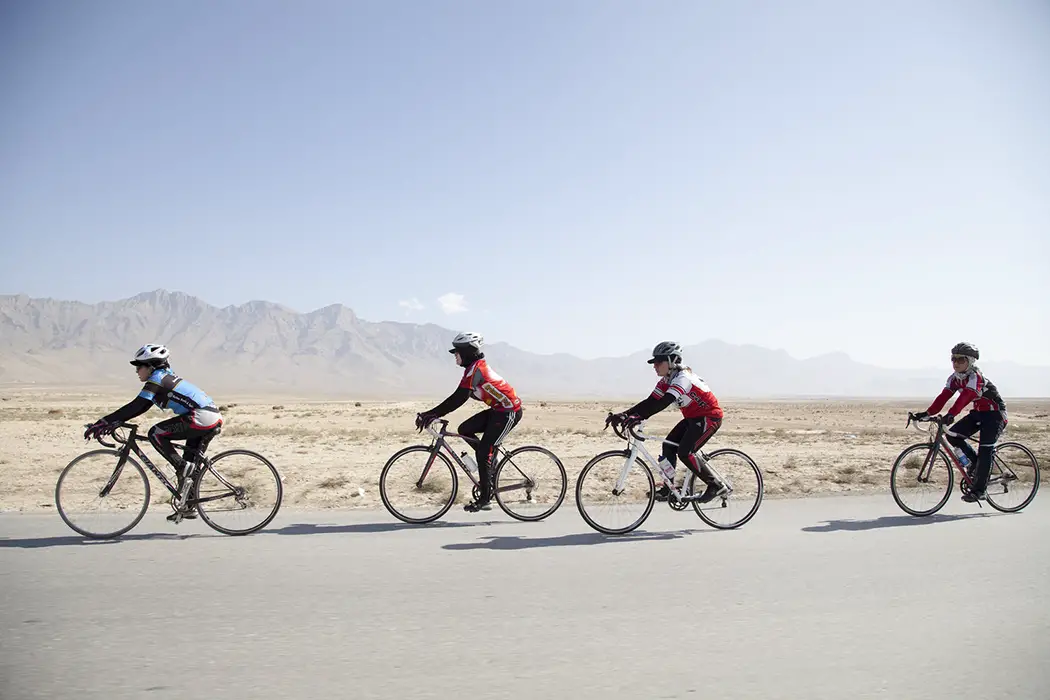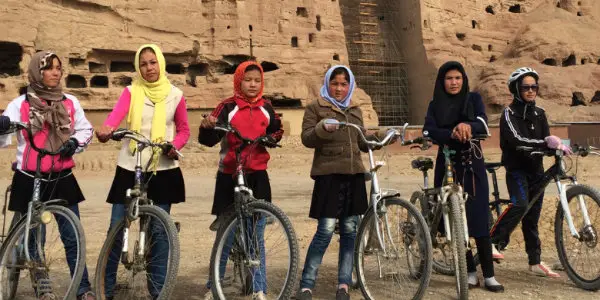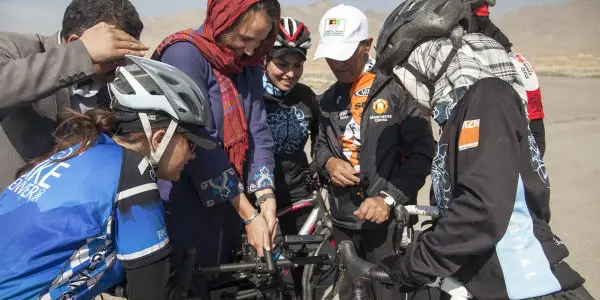AFGHAN CYCLES: A Powerful Ride To Freedom

Becky spends her days working in TV and she spends…
Afghan Cycles is a documentary of two parts which are unequivocally linked together. Director Sarah Menzies weaves a story about Afghan women fighting for the (seemingly small) right to ride a bicycle with another much more complex narrative about the effects of war and extremism on a country, and the refugee crisis. Leading us through both of these stories are a handful of Afghan women, most of them around university age, who belong to the National Cycling team.
From capital city Kabul (a slightly more liberal setting), to the rural town of Bamiyan – cycling is a way for these young women to exercise, challenge themselves, keep fit and make friends. Their desire to ride a bike, however, is challenged by the conservative regime in the country in addition to relatively recent rise of the Taliban – many of whom have issued death threats against the girls for continuing to cycle.
A Literal and Physical Journey
Beginning in Kabul, Afghan Cycles dives in at the root of the issue for the Women’s National Cycling Team of Afghanistan. Without overwhelming historical context, Cycles explains the decline in freedoms afforded to women since around 1979, when extremists groups began to take advantage of the fracturing of democracy within the Afghan political sphere.
Despite the growing oppression of women within the country, a handful of young women are determined to pursue their passion for cycling – and often do so with severe threats to their lives and families.
Though Menzies interviews and films all of the women on both the Kabul and Bamiyan cycling teams, it is through the eyes of best friends Frozan and Mosama that the majority of the story is told.

A third act twist involving Frozan fleeing Afghanistan and seeking asylum in France means that Afghan Cycles suddenly begins to tell a story which is perhaps bigger (and more global) than it began doing. This is really to the film’s benefit, as Frozan is a compelling character, and witnessing her monumental journey firsthand only allows the audience to identify with her more. Though Frozan’s journey is retold in an interview, knowing Frozan in Afghanistan, seeing her friendships and love of cycling means that we are wholly engaged in her narrative.
Menzies’ choice to edit in preexisting news reels to explain the political situations in Afghanistan, is also a welcome one. The intercutting of these reports keeps the film feeling current and ‘of the moment’, whilst also avoiding cumbersome or long text cards that could otherwise explain the complex political issues.
The bicycle serves two purposes within the documentary – the physical vehicle on which everything hinges (the ability to train, their freedom, travel), but it’s a vehicle for the audience too. The way in which a bicycle moves is regularly replicated by the camera, and the film is almost entirely set against a soundscape of click wheel spokes, or the quiet whirring of wheels against tarmac. The result ensures that we also feel like we are on this journey with the girls – on their training rides and on their struggle to be allowed to ride a bike.
Whose Voice?
The only jarring part of Menzies‘ otherwise very complete documentary, is the interview with a member of the Taliban. Whilst it does show the audience exactly how terrifying it must be to live amongst those threats (and to keep cycling regardless), it felt out of place in Afghan Cycles. So much of the film is about the girls’ experiences and the film gives them a platform and a voice to talk about those things.
It’s not clear, to me, what the interview with the Taliban member added to the film. I had already been wholly convinced of the danger that Frozan, Mosama and the others are in, from their own testimony, and I felt that hearing the threats from the girls themselves (as they had experienced them) felt far more honest than listening to anyone else – especially from the perpetrator of that violence.

Despite this, Afghan Cycles is an otherwise near perfect depiction of the crisis affecting women and girls in Afghanistan. Stories of individuals struggles (particularly Frozan, as her journey is such a literal one) are tied expertly together to represent a larger group of people – indeed a whole nation of people – who are suffering.
The daily battles that the young women of Afghan Cycles face represent the struggles of all of those living as oppressed peoples, on a micro-scale. These young women are bold, brave and determined to continue on with their lives in the face of terrifying adversity. The film reaches into this determination and brings it to the forefront, which allows it to end on hope rather than despair.
Afghan Cycles: Authenticity Reigns Supreme
Afghan Cycles is a true and authentic journey, filled with moments of pure happiness and heartbreaking sadness. The contributors are its biggest triumph, though, and are captivating from the first frame right up to the last. It’s a film which captures the current refugee crisis and all of the horrors that entails, whilst humanising those caught up in it.
What did you think of Afghan Cycles? Let us know in the comments!
Afghan Cycles was screened at Hot Docs, and screening updates will be released here.
Does content like this matter to you?
Become a Member and support film journalism. Unlock access to all of Film Inquiry`s great articles. Join a community of like-minded readers who are passionate about cinema - get access to our private members Network, give back to independent filmmakers, and more.
Becky spends her days working in TV and she spends every other minute writing about cinema, TV & feminism. Based in London, she also likes drinking gin, re-watching 'The X Files' and writing about on-screen representation and all manner of things over at femphile.com













